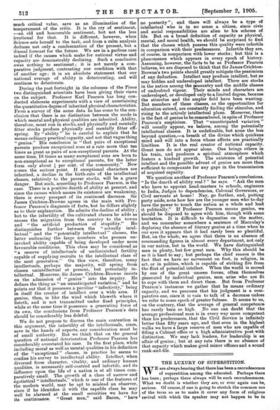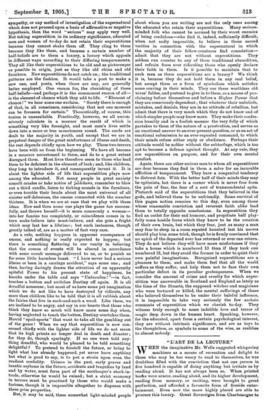THE LUXURY OF SUPERSTITION.
WE are always hearing that there has been a recrudescence of superstition among the educated. Perhaps there has been; perhaps there always will be such recrudescences. What we doubt is whether they are, or ever again can be, serious. Of course, if one is going to stretch the common use of the term so as to make it cover any form of religious revival with which the speaker may not happen to be in
sympathy, or any method of investigation of the supernatural which does not proceed upon a basis of affirmative or negative hypothesis, then the word "serious" may apply very well. But taking superstition in its ordinary significance, educated men and women of to-day do not retain their superstitions because they cannot shake them off. They cling to them because they like them, and because a certain number of half-beliefs are to them a luxury, a luxury which appeals in different ways according to their differing temperaments. They all like their superstitions to be old and as picturesque as possible in origin, just as they like old china and old furniture. New superstitions do not catch on ; the traditional patterns are the fashion. It would take a poet to make a new one, and poets, when there are any, are generally better employed. One reason for, the cherishing of these half-beliefs—and perhaps it is the commonest reason of all— is the element of chance which they add to life. "Element of chance ! " we hear some one exclaim. "Surely there is enough of that, in all conscience, considering that not one moment can be foreseen for certain." Theoretically, of course, this truism is unassailable. Practically, however, we all uncon- sciously calculate in a manner the result of which is something very like foresight, and most men's lives settle down into a more or less monotonous round. The cards are dealt to the majority in youth, and except that we are in perpetual danger of the great misfortunes of illness and death, the rest depends chiefly upon how we play. These two terrors have been with us from the beginning. We have all become in a measure accustomed to them, and do to a great extent disregard them. Most lives therefore seem to those who lead them to be deficient in the element of luck ; and, like children, they long to introduce it, and consequently invent it. It is about the lighter side of life that superstition plays now among the educated. Not many people in great anxiety consult oracles or take notice of jackdaws, remember to blow out a third candle, listen to ticking sounds in the furniture, or even trouble their heads about the most universal of all sinister self-delusions, the omens connected with the number thirteen. It is when we are at ease that we play with these ideas. Now and then some one plays the game too success- fully, and throws herself—it is more commonly a woman— into her fancies too completely, or coincidence comes in to turn make-believe into must-believe, and she gets a fright which may last her a lifetime ; but such instances, though greatly talked of, are as a matter of fact very rare.
As a rule, nothing happens in apparent consequence of omens, and nothing is' really expected to happen ; but there is something flattering to our vanity in believing that the course of events will be altered in accordance with some occult message delivered to us, or to punish us for some little harmless boast. "I have never had a serious illness or been in a carriage accident," says some one ; and then, having daringly drawn the attention of an apparently spiteful Power to his present state of happiness, he knocks under the table and says " Unberufen ! "—in fact, touches a button and switches Destiny off again. It is all dreadful nonsense ; but most of us have some pet imagination which we do not like to have destroyed by ridicule, any more than children like to be told that it is all rubbish about the fairies that live in such-and-such a wood. Like them, we are inclined to be angry, and say in our hearts that those who think they know so much will know more some day when, having neglected to touch the button, Destiny overtakes them. Horrid " spoil-sports " that want to take all the gambling out of the game ! When we say that superstition is now con- cerned chiefly with the lighter side of life we do not mean that its high priests no longer deal in death and disaster ; for they do, though sparingly. If no one were told any- thing dreadful, who would be pleased to be told something delightful ? To pretend to foretell the future, or bring to light what has already happened, yet never have anything but what is good to say, is to put a strain upon even the readiest credulity. Crimes in the past, early graves and lunatic asylums in the future, accidents and tragedies by land and by water, must form part of the soothsayer's stock-in- trade, otherwise he would be ruined ; but a Alia economy in terrors must be practised by those who would make a fortune, though it is impossible altogether to dispense with these grim properties.
But, it may be said, these somewhat light-minded people about whom you are writing are not the only ones among the educated who retain their superstitions Many serious- minded folk who cannot be accused by their worst enemies of being credulous—who find it, indeed, sufficiently difficult, when not sadly impossible, to believe in those sacred verities in connection with the supernatural in which the majority of their fellow-creatures find consolation-- admit that they are not without superstitions. They seldom run counter to any of these traditional absurdities, and refrain from ever ridiculing those who openly declare their faith in them. Is it possible to maintain that to such men as these superstitions are a luxury? We think it is, because they do not hold them in any real belief, but accept them as a form of symbolism which satisfies some craving in their minds. They use these worthless old wives' fables, and pretend to give in to them, as a means of pro- claiming before themselves and before a Higher Power that they are consciously dependent ; that whatever their unbeliefs, mistakes, and denials, they are in no attitude of rebellion, but admit that there is very much which they do not know and of which simpler people may know more. They make their confes- sion humbly and in a foolish manner the very folly of which partakes to them of the nature of a prostration, and serves as an emotional answer to an ever-present question, or as an act of emotional submission to an ever-repeated command, to which their minds refuse either reply or obedience. Perhaps their attitude would be nobler without the subterfuge, which is too apt to become a defence against thought. At any rate, they are superstitious on purpose, and for their own mental comfort.
Again, there are other serious men to whom all superstitions are dear because they find in theta a salve for an incurable affliction of temperament. They have a congenital tendency to distrust fate. With the better half of their minds they may be optimists, but there is a corner which is never free from the pain of fear, the fear of a sort of transcendental spite. Plutarch said of the superstitious that they believed in the gods, and believed them to be unfriendly. Some survival of this pagan notion remains to this day, even among those whose reasonable conviction and reverent faith alike lead them to totally opposite conclusions. In superstition they find an outlet for their sad humour, and propitiate half play- fully some hostile force which they know to be the creation of their own brain, but which they fear, just as many a man may fear to sleep in a room reputed haunted lest his nerves should play him some trick, though he is firmly convinced that no spirit of the departed ever has returned or ever can return. They do not believe they will have more misfortunes if they take a house which is numbered 13 than if they took one numbered 31, but they avoid the former in order to quiet their own painful imaginations. Recognised superstitions are a pleasure to them, and make them feel that all the world suffers as they suffer, and help them not to face their own particular defect in its peculiar grotesqueness. When we consider the amount of crime and cruelty for which super- stition was answerable in Scotland and England as lately as the time of the Stuarts, the supposed witches and magicians who were tortured or killed, the mental sufferings of those who believed themselves to be under their baleful influence, it is impossible to take very seriously the few archaic remnants of superstition which we cherish to-day. They witness truly enough to some indelible love and terror of magic deep down in the human heart. Speaking, however, for the educated, apart from a certain psychological interest, they are without intrinsic significance, and are as toys to the thoughtless, as symbols to some of the wise, as realities to almost nobody.



































 Previous page
Previous page